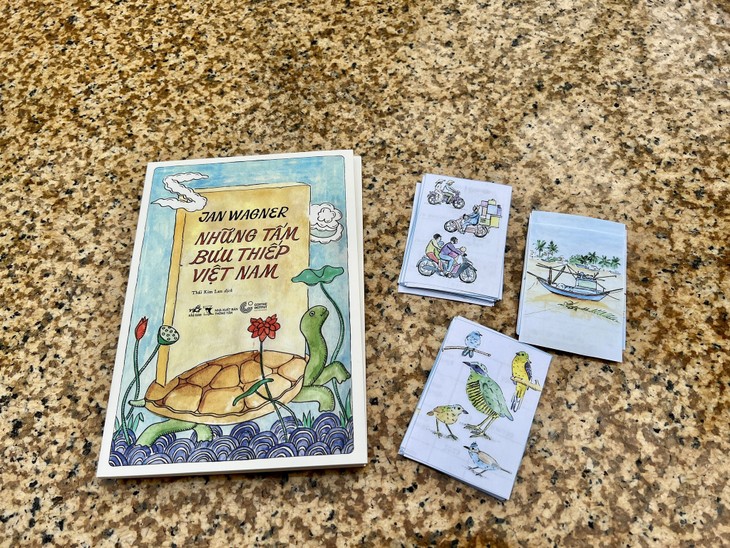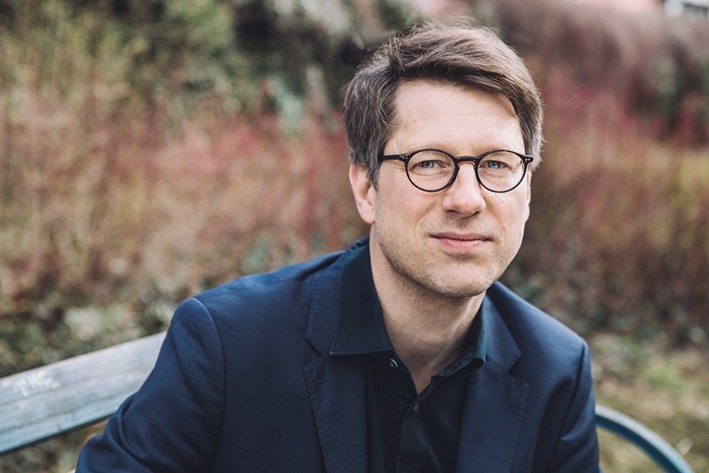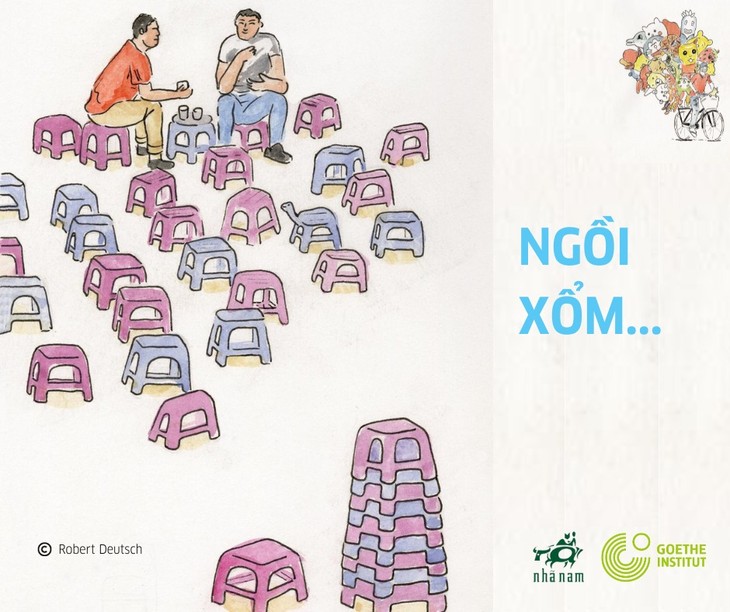In comparison with Vietnamese writers, how does a foreign observer describe Vietnam’s rivers, markets, motorbikes, pho, and draft beer? Renowned contemporary German poet Jan Wagner provides a fascinating answer to that question in his book “Vietnamese Postcards: An everyday life in Vietnam”.

The cover of the “Vietnamese Postcards: An everyday life in Vietnam” by Jan Wagner (Photo: Goethe Hanoi)
The book, published by Nha Nam Culture and Media Company under the sponsorship of the Goethe-Institut Hanoi, is excerpted from “Der glückliche Augenblick - Beiläufige Prosa” (“The happy moment - Casual prose”), Jan’s collected observations made during a 2017 exchange program in which he introduced his poetry to audiences in Hanoi, Hue, and Ho Chi Minh City.
As Jan is from Northern Germany - a completely different climate and a different cultural and geographical surrounding - so everything was new to him.
“In these postcards I think I described the first morning waking up in Hanoi. We arrived late at night. It was dark already and we woke up and it's always fascinating for me to feel or to sense the strangeness and the beauty of new and completely unknown surroundings by listening to the birds, listening to the sounds in general from the street, but also to the birds, which are so different,” Jan recalled.
Jan said waking up on the first day in Hanoi, listening to the birds outside was quite a lovely and quite a vivid impression for him still today.
“That’s why so many birds also appear, of course, in these texts but there would be so many vivid memories and impressions – the many markets we went to, the celebration of food and the whole central aspect in every street we had a chance to visit. All that really form one very powerful memory, so it would be hard to single out one impression. It's really one overwhelming memory still,” said Jan.

Jan Wagner, born in 1971 in Hamburg, lives in Berlin. He studied English and American studies at Hamburg University and at Trinity College Dublin. (Photo: Nadine Kunath)
At the launch of the Vietnamese version of the book, Oliver Brandt, Director of the Goethe-Institut Hanoi, said that if an outside view of our own culture can irritate us, or inspire us, or make us smile, intelligent and creative observation can enable us to rediscover our everyday life, which often remains invisible because we take it for granted.
That’s the gift of Jan Wagner who, with meticulous, detailed observation, captures life on the streets through an image of stools and people squatting, to take one example.
Jan writes, “Who is squatting? Everyone. The shopkeepers, the bus drivers, and the bike couriers during their break, the bankers and businessmen during their lunch break, lottery ticket sellers, soldiers, and schoolgirls.”

An illustration by Robert Deutsch
Editor and writer Dr. Thai Kim Lan, an author on philosophy and religion who handled the book’s translation, said that what stands out in Jan’s writing is his sharp observation and his feeling for nature and natural scenery.
“In Jan’s “Vietnamese Postcards”, we note two aspects: first of all, Vietnam, and second, literary values. Jan’s book can be compared to the Vietnamese work “Hanoi: 36 streets and guilds” by writer Thach Lam, because it both describes geographical places and exhibits a very poetic style,” Lan commented.
“That’s why “Hanoi: 36 streets and guilds” lives in the memory of Vietnamese people. Works about geographical places with a writing style that transcends literary formula will live on and on and no one will be able to surpass them,” she noted.

Robert Deutsch, born in 1981 in Köthen, lives Leipzig. His debut Turing was released in March 2017. His works have been exhibited in Porto, Berlin, Leipzig, and Los Angeles and published in several magazines. (Photo: Yvonne Most)
“Vietnamese postcards: An everyday life in Vietnam” is illustrated by Robert Deutsch, who has worked as a freelance illustrator and graphic designer since 2012 and received the GiebichenStein Design Award for Best Communication in 2014.
To create the vivid illustrations for “Vietnamese postcards”, Robert said he compared the book to his own experiences and research about Vietnam and its people in order to draw exactly what he felt Jan wanted to convey.
Dr. Lan said that what makes the book remarkable is that Jan turns trivial things which we rarely pay attention to – mosquitos, a bar of soap, a hard-to-reach hook, a plate of cold rice – into something literary. Jan’s pen turns those things into fascinating, literary reflections on Vietnam.
Hanoi writer Nguyen Truong Quy, who was nominated for the “For the love of Hanoi” prize, had this to say about Jan’s book, “What surprised me about Jan’s book was that it’s so poetic. According to Dr. Lan, because Jan is a poet, he didn’t structure his book like a travel book. It’s a combination of long poems and descriptive stories.”
Jan begins the story by describing how hot the weather is, what Hanoi’s streets look like, and then gets into deeper experiences, always saying something relatable about cultural layers. The book delivers the keen experience of a poet supported by lively illustrations, said Quy.
Jan said the 86-page book is his thank to Vietnam, the country that made his fascinating literary trip.
Bao Tram